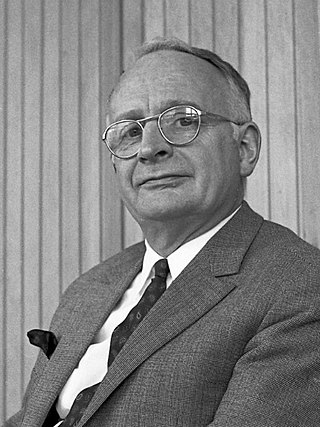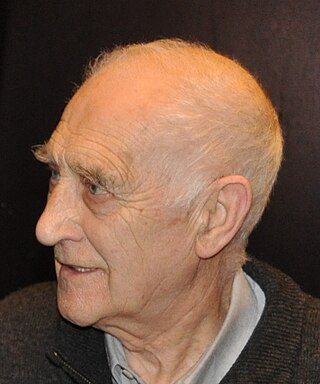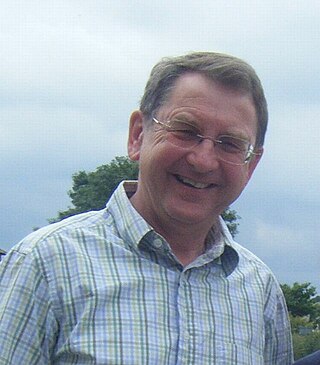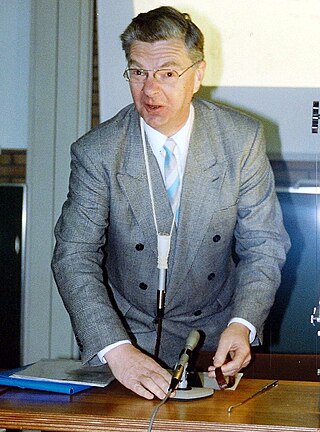Related Research Articles

Stephen Richard "Steve" Bourne is an English computer scientist based in the United States for most of his career. He is well known as the author of the Bourne shell (sh), which is the foundation for the standard command-line interfaces to Unix.

Adriaan "Aad" van Wijngaarden was a Dutch mathematician and computer scientist. Trained as a mechanical engineer, Van Wijngaarden emphasized and promoted the mathematical aspects of computing, first in numerical analysis, then in programming languages and finally in design principles of such languages.

Nobuo Yoneda was a Japanese mathematician and computer scientist.
Eric "Rick" C. R. Hehner is a Canadian computer scientist. He was born in Ottawa. He studied mathematics and physics at Carleton University, graduating with a Bachelor of Science (B.Sc.) in 1969. He studied computer science at the University of Toronto, graduating with a Master of Science (M.Sc.) in 1970, and a Doctor of Philosophy (Ph.D.) in 1974. He then joined the faculty there, becoming a full professor in 1983. He became the Bell University Chair in software engineering in 2001, and retired in 2012.
John Edward Lancelot Peck was the first permanent Head of Department of Computer Science at the University of British Columbia (UBC). He remained the Head of Department from 1969 to 1977.
Barry James Mailloux obtained his Master of Science (M.Sc.) in numerical analysis in 1963. From 1966, he studied at Amsterdam's Mathematisch Centrum under Adriaan van Wijngaarden, earning a Doctor of Philosophy (Ph.D.) in 1968.
Richard Simpson Bird was an English computer scientist.
Lambert Guillaume Louis Théodore Meertens or L.G.L.T. Meertens is a Dutch computer scientist and professor. As of 2020, he is a researcher at the Kestrel Institute, a nonprofit computer science research center in Palo Alto's Stanford Research Park.

Willem Louis van der Poel is a Dutch computer scientist, who is known for designing one of the first computers to be designed in the Netherlands, the Zeer Eenvoudige Binaire Reken Automaat (ZEBRA), translated as Very Simple Binary Automatic Calculator.
Micha Sharir is an Israeli mathematician and computer scientist. He is a professor at Tel Aviv University, notable for his contributions to computational geometry and combinatorial geometry, having authored hundreds of papers.
Klaus Samelson was a German mathematician, physicist, and computer pioneer in the area of programming language translation and push-pop stack algorithms for sequential formula translation on computers.

Roland Carl Backhouse is a British computer scientist and mathematician. As of 2020, he is Emeritus Professor of Computing Science at the University of Nottingham.
Charles Carroll Morgan is an American computer scientist who moved to Australia in his early teens. He completed his education there, including a Doctor of Philosophy (Ph.D.) degree from the University of Sydney, and then moved to the United Kingdom in the early 1980s. In 2000, he returned to Australia.

Jeremy Gibbons is a computer scientist and professor of computing at the University of Oxford. He serves as Deputy Director of the Software Engineering Programme in the Department of Computer Science, Governing Body Fellow at Kellogg College and Pro-Proctor of the University of Oxford.
Eiiti Wada is a computer scientist and emeritus professor at the University of Tokyo and the Research Director of Internet Initiative Japan (IIJ), a computer network technology company. He is one of the creators of the Happy Hacking Keyboard.
IFIP Working Group 2.1 on Algorithmic Languages and Calculi is a working group of the International Federation for Information Processing (IFIP).
Conor McBride is a Reader in the department of Computer and Information Sciences at the University of Strathclyde. In 1999, he completed a Doctor of Philosophy (Ph.D.) in Dependently Typed Functional Programs and their Proofs at the University of Edinburgh for his work in type theory. He formerly worked at Durham University and briefly at Royal Holloway, University of London before joining the academic staff at the University of Strathclyde.
Charles Abraham Katz was an American mathematician and computer scientist known for his contributions to early compiler development in the 1950s.

Michel Sintzoff was a Belgian mathematician and computer scientist.
Yanhong Annie Liu is a computer scientist and professor of computer science at Stony Brook University where she works on new programming languages, software systems, algorithms, program design, optimizing, analysis, and transformations, intelligent systems, distributed computing systems, and computer security.
References
- ↑ "Curriculum Vitae: Thomas Stephen Edward Maibaum BSc PhD CEng MIEEE FIEE FRSA". McMaster University . Retrieved December 29, 2011.
- ↑ "Tom Maibaum". www.chairs-chaires.gc.ca. Canada Research Chairs. Retrieved December 29, 2011.
- 1 2 Maibaum, Thomas (2011-09-01). "Curriculum Vitae: Thomas Stephen Edward Maibaum" (PDF). Department of Computing and Software. McMaster University. Retrieved 2020-02-07.
- ↑ Jeuring, Johan; Meertens, Lambert; Guttmann, Walter (2016-08-17). "Profile of IFIP Working Group 2.1". Foswiki. Retrieved 2020-10-25.
- ↑ Swierstra, Doaitse; Gibbons, Jeremy; Meertens, Lambert (2011-03-02). "ScopeEtc: IFIP21: Foswiki". Foswiki. Retrieved 2020-10-25.